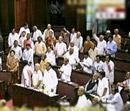 New Delhi, Mar 22: The Rajya Sabha witnessed rowdy scenes Friday before it went on a recess as agitating members from the DMK and AIADMK turned violent, breaking the chairperson's mike.
New Delhi, Mar 22: The Rajya Sabha witnessed rowdy scenes Friday before it went on a recess as agitating members from the DMK and AIADMK turned violent, breaking the chairperson's mike.
The upper house met at 2.30 p.m. after two adjournments. Members from DMK and AIADMK, who were protesting over the plight of Sri Lankan Tamils, trooped near the chairperson's podium.
Contending that the anti-Sri Lanka resolution in the United Nations Human Rights Council was not strong enough, they accused the government of not doing enough.
Renuka Choudhary, who was presiding over the house, pleaded with the members to go back to their seats. When she refused to adjourn the house, some members snatched and tore papers from the chairperson's podium.
The chair still continued the proceedings, after which V. Maitreyan of the AIADMK broke the microphone at the chairpersons' podium.
External Affairs Minister Salman Khurshid, who was making a statement on the return of Italian marines accused of killing two Indian fishermen, looked visibly shocked at the incident.
Amid the ruckus, Chowdhary adjourned the house till April 22. "Do not behave like animals," she told the protesting members. Earlier, the upper house was adjourned twice over the same issue. The first adjournment came soon after it met at 11 a.m., when Chairman M. Hamid Ansari adjourned the house till noon. At noon it was adjourned again till 2.30 p.m.






Comments
Add new comment